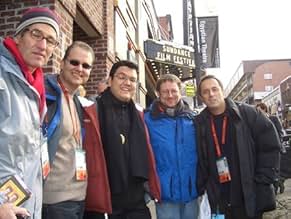IMDb-BEWERTUNG
5,5/10
1890
IHRE BEWERTUNG
Füge eine Handlung in deiner Sprache hinzuThe lives of three lonely strangers intersect while commuting on New York's 1 and 9 subway lines.The lives of three lonely strangers intersect while commuting on New York's 1 and 9 subway lines.The lives of three lonely strangers intersect while commuting on New York's 1 and 9 subway lines.
- Regie
- Drehbuch
- Hauptbesetzung
- Auszeichnungen
- 3 Gewinne & 1 Nominierung insgesamt
Nicolle Rochelle
- Melanie
- (as Nicole Leach)
Karen Olivo
- Ana
- (as Karen Olivio)
Keren Love Perilman
- Jen
- (as Keren Perilman)
Empfohlene Bewertungen
Ah, look at all the lonely people. Adrift in Manhattan focuses on three very lonely New Yorkers whose lives are destined to intersect. Heather Graham has the role which is meant to tie the plot together. She plays optometrist Rose Phipps, a woman who has suffered a great loss and who now lives alone while trying to piece her life back together. Dominic Chianese plays our second main character, Tommaso, an elderly painter, classical music enthusiast and mailroom worker. As we meet him he is being informed by Rose that he is going blind. And then there is young photo shop worker Simon, played by Victor Rasuk. One day Simon sees Rose sitting on a bench in the park and decides to more or less become a stalker, following her around the city taking her picture. He even follows her all the way home, taking pictures of her through the windows. Creepy? You bet.
As the film progresses we learn more about each of these characters. We learn why it is that Rose is seemingly alone in the world. We learn that Simon is extremely shy and withdrawn, apparently having very little idea of how to relate to people. This may have something to do with his mother with whom he has one of the most uncomfortably, bizarrely affectionate parent/child relationships ever seen. The focus of the story really is Rose and Simon. Which is a shame because Tommaso is far and away the most interesting character in the film. We see his frustrations as he deals with his failing sight, blindness akin to a death sentence for this simple but proud man who so loves to paint. And we see him fall in love with a much younger woman from his office, Isabel, played by Elizabeth Peña. Their relationship tugs at the heartstrings, their interactions always compelling. And Chianese and Peña easily give the best performances in the film. Rather unfortunately it seems the movie is always rushing through Tommaso's scenes so the focus can get back to Rose.
The film meanders about, cutting back and forth between our three main protagonists. But the story never really pays itself off. Tommaso is compelling, Rose somewhat less so, and Simon, barely even communicative, hard to identify with. Eventually Rose does something which makes absolutely no sense, something you would never believe anyone in her position would even conceive of doing, and from there the movie really falls apart. For a film which seemed to have some genuine promise, especially in Tommaso's story, in the end it just kind of limply fizzles out. Chianese did excellent work and created a great character and he and Peña work together wonderfully. But the story which surrounds them ultimately falls flat.
As the film progresses we learn more about each of these characters. We learn why it is that Rose is seemingly alone in the world. We learn that Simon is extremely shy and withdrawn, apparently having very little idea of how to relate to people. This may have something to do with his mother with whom he has one of the most uncomfortably, bizarrely affectionate parent/child relationships ever seen. The focus of the story really is Rose and Simon. Which is a shame because Tommaso is far and away the most interesting character in the film. We see his frustrations as he deals with his failing sight, blindness akin to a death sentence for this simple but proud man who so loves to paint. And we see him fall in love with a much younger woman from his office, Isabel, played by Elizabeth Peña. Their relationship tugs at the heartstrings, their interactions always compelling. And Chianese and Peña easily give the best performances in the film. Rather unfortunately it seems the movie is always rushing through Tommaso's scenes so the focus can get back to Rose.
The film meanders about, cutting back and forth between our three main protagonists. But the story never really pays itself off. Tommaso is compelling, Rose somewhat less so, and Simon, barely even communicative, hard to identify with. Eventually Rose does something which makes absolutely no sense, something you would never believe anyone in her position would even conceive of doing, and from there the movie really falls apart. For a film which seemed to have some genuine promise, especially in Tommaso's story, in the end it just kind of limply fizzles out. Chianese did excellent work and created a great character and he and Peña work together wonderfully. But the story which surrounds them ultimately falls flat.
Adrift in Manhattan is a small, lovingly made, melancholy film about the intersecting lives of various emotionally wounded people in Manhattan. As I watched the film though, I felt something was "off." Then I realized it, the Manhattan in this movie is much too quiet. I lived in Manhattan for years and one of my overriding memories of it is the constant noise; sirens, garbage trucks, horns honking, boom boxes, crazy people yelling, etc. Yet, in this film Manhattan is a quiet, dignified place. If only! I wonder what the film would have been like if it actually had the background noise that's so much a part of the city. I think it would have improved the film and made the characters' loneliness all the more poignant.
Though there have been many films of late that address the issues of the isolation of the individual in a society increasingly settling for homogeneity, few have the honesty and simplicity of presentation as Alfredo De Villa's ADRIFT IN MANHATTAN. Perhaps the reason this film works so well is that instead of dealing with the usual tropes, De Villa restricts his story to three individuals who are suffering isolation in the noise and autonomy of New York City and are thus 'adrift' in a life that seems flat and without a beacon of hope. The story De Villa weaves is one of interaction of these characters by almost serendipitous incidents, moments that change their lives - at least for a while.
Teenager Simon Colon (Victor Rasuk) lives with his overbearing mother Marta (Marlene Forte) and gets through his life almost without speaking, working in a camera shop, spending his idle hours photographing people in the park. Tommaso Pensara (Dominic Chianese) is an elderly painter and music lover who lives alone and supports himself by being the 'mail boy' in a large firm: his loneliness is heightened when he discovers he has macular degeneration and will go blind. The physician who makes his diagnosis is Dr. Rose Phipps (Heather Graham) who is grieving from the recent death of her 2-year old child and is unable to continue her marriage to literature professor Mark Phipps (William Baldwin).
The threads of coincidence begin to tie these people together when Simon begins to photograph Rose in a manner that resembles stalking, when Tommaso notices and desires and older lady at his workplace, Isabel Parades (Elizabeth Peña) and is encouraged by Dr Rose to share his potential blindness with this friend, and when Rose explores the attention Simon bestows on her, filling an emotional need for both parties. Naturally the development of these intersections is more complex but at the same time the manner in which they develop is very tender and gentle.
Some viewers may find the film meandering a bit too much: this is not linear storytelling but rather shifts in incidents and moods and gradual changes that occur among these simple but needy people, much like the coincidences and random kindnesses occur to the sensitive eye. The cast is very fine and the cinematography and musical score sustain the mood of the piece. This film requires involvement on the part of the viewer, and that involvement has its rewards. Grady Harp
Teenager Simon Colon (Victor Rasuk) lives with his overbearing mother Marta (Marlene Forte) and gets through his life almost without speaking, working in a camera shop, spending his idle hours photographing people in the park. Tommaso Pensara (Dominic Chianese) is an elderly painter and music lover who lives alone and supports himself by being the 'mail boy' in a large firm: his loneliness is heightened when he discovers he has macular degeneration and will go blind. The physician who makes his diagnosis is Dr. Rose Phipps (Heather Graham) who is grieving from the recent death of her 2-year old child and is unable to continue her marriage to literature professor Mark Phipps (William Baldwin).
The threads of coincidence begin to tie these people together when Simon begins to photograph Rose in a manner that resembles stalking, when Tommaso notices and desires and older lady at his workplace, Isabel Parades (Elizabeth Peña) and is encouraged by Dr Rose to share his potential blindness with this friend, and when Rose explores the attention Simon bestows on her, filling an emotional need for both parties. Naturally the development of these intersections is more complex but at the same time the manner in which they develop is very tender and gentle.
Some viewers may find the film meandering a bit too much: this is not linear storytelling but rather shifts in incidents and moods and gradual changes that occur among these simple but needy people, much like the coincidences and random kindnesses occur to the sensitive eye. The cast is very fine and the cinematography and musical score sustain the mood of the piece. This film requires involvement on the part of the viewer, and that involvement has its rewards. Grady Harp
I really enjoyed this movie. The film has this touching relationship between Heather Graham's character and the young man obsessed with capturing her in photos. At first, I was afraid it was borderline stalking, and I kept on waiting for something bad to happen to the young man. Gradually, the boy's photos reveals something deep and personal about Heather Graham's character. When they do finally meet, the outcome is surprising. All the actors put in good performances, especially Heather Graham. If you like character driven movies, then this movie will appeal to you. I also like the pacing of the film. It's slow and methodical. Often films rush through their stories, but this one takes its time.
I loved this movie. The feeling and pace was graceful, the cinematography and music wonderful. There's loneliness and loss here, but it's covered in a way that makes you just fall in love with the characters and care for them, hope they come through. For those that can identify with the vib of New York, the film is likely to be appreciated even more, as elements of the subway and streets come through realistically.
This movie visits the lives of three different people, and how they coincidentally intermingle within the movie time line. The other characters in the movie add some color and background, and do well also.
I've watched this movie multiple times and every time I come away satisfied, and more so: inspired. You can use this movie to better your life, to better your art. Strongly recommend watching it on a quiet, relaxing night.
This movie visits the lives of three different people, and how they coincidentally intermingle within the movie time line. The other characters in the movie add some color and background, and do well also.
I've watched this movie multiple times and every time I come away satisfied, and more so: inspired. You can use this movie to better your life, to better your art. Strongly recommend watching it on a quiet, relaxing night.
Wusstest du schon
- WissenswertesThere is an image of a hand hanging on a piece of paper in the mail room (about 1/2 through the movie) that matches the configuration of Heather Graham's hand on the window, as she looks out of her apartment (about 1/4 through the movie).
- Zitate
Mr. Sneider: The guy who invented the digital camera: the number-one reason to repeal the assault-weapon ban.
- VerbindungenSpoofs French Connection - Brennpunkt Brooklyn (1971)
Top-Auswahl
Melde dich zum Bewerten an und greife auf die Watchlist für personalisierte Empfehlungen zu.
- How long is Adrift in Manhattan?Powered by Alexa
Details
Box Office
- Budget
- 4.000.000 $ (geschätzt)
- Bruttoertrag in den USA und Kanada
- 2.099 $
- Eröffnungswochenende in den USA und in Kanada
- 2.099 $
- 23. Sept. 2007
- Weltweiter Bruttoertrag
- 90.272 $
- Laufzeit
- 1 Std. 31 Min.(91 min)
- Farbe
- Sound-Mix
- Seitenverhältnis
- 1.85 : 1
Zu dieser Seite beitragen
Bearbeitung vorschlagen oder fehlenden Inhalt hinzufügen































